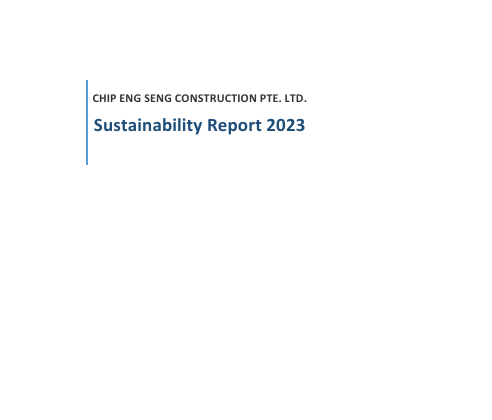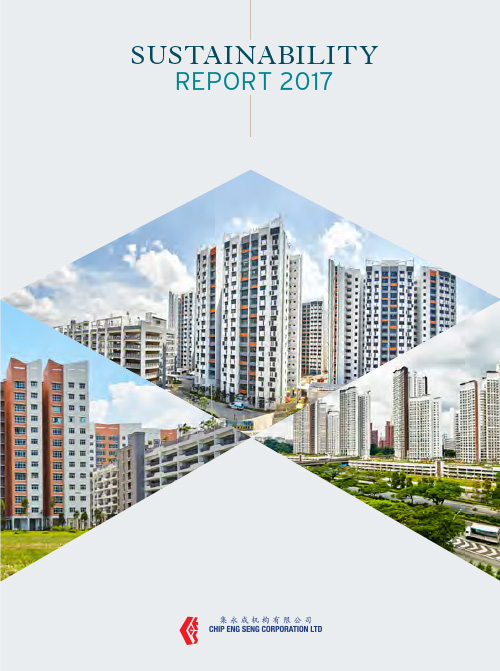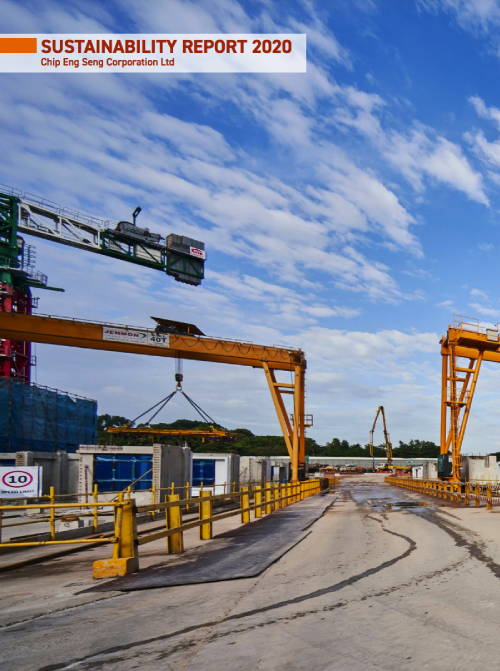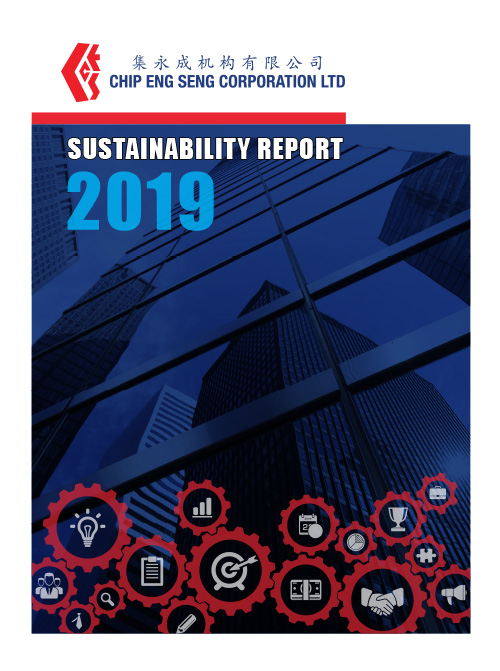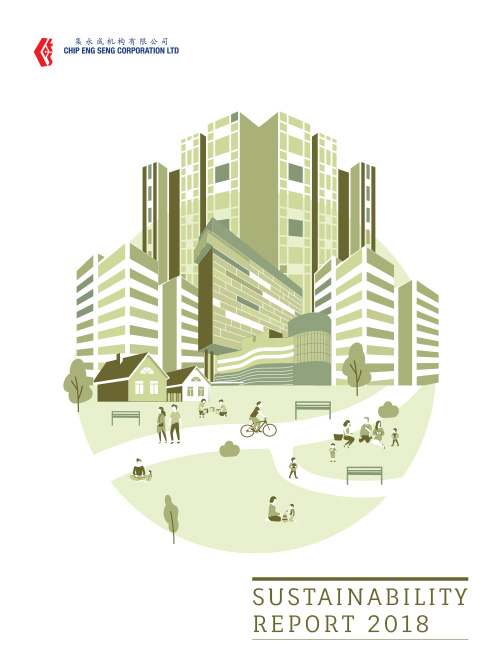Our Approach
Sustainability Framework
Chip Eng Seng is committed to sustainably growing our business and we recognized the growing importance of good performance in environmental, social and governance (“ESG”) issues for a range of stakeholders. We firmly believe that forging good relationships with our stakeholders is crucial for the sustainable growth of our business.
Sustainability is one of key pillars of our business strategy that underpins our value creation process. As our business in construction and property development consume significant resources, energy, materials and also employs large numbers of workers. Chip Eng Seng aims to improve energy efficiency, water conservation, waste management and to minimize the emissions footprint from buildings we construct, develop or manage. The well-being of our workers and workplace safety and health, a critical issue for the construction sector is also amongst one of a top priority for us. Our customers’ personal data privacy is paramount and have in place controls system to prevent any unauthorized exposure. Chip Eng Seng maintains zero-tolerance position against bribery and corruption and is committed to compliance with applicable economic, labour and social laws and regulations.
All these ambitions in turn support the United Nations Sustainability Development Goals (“SGDs”). The scale and ambition of the SDGs require the collective effort of governments, businesses, organisations and all levels of society. Chip Eng Seng believes in playing its part to help meet these goals. In 2018, we mapped our business operations with the SDGs and had identified the goals where we can make a contribution. In 2019, we continued strategic integration of the SDGs into our business and had identified specific SDGs targets to monitor our contribution to sustainable development.
The details of how our material topics support the specific SDGs targets can be found in our latest Sustainability Report.
Sustainability Governance
Chip Eng Seng’s Board provides strategic direction for adopting and implementing sustainability strategies and policies and oversees the management and monitoring of the sustainability policies. The Sustainability Management Committee (“SMC”), chaired by the Group’s CEO with the Group’s CFO as the deputy chairman, supervises the adoption and implementation of the sustainability strategies and policies and provides regular updates to the Board.
A project team assists the SMC with executives drawn from across the Group’s diverse business functions. The project team is responsible for collecting sustainability performance data for monitoring and reporting. A senior executive acts as project coordinator and works closely with the project team to ensure the necessary ESG performance data is gathered for sustainability reporting.
Senior representatives from various business functions actively contribute to the sustainability initiatives.
Materiality
We follow the GRI standards and principle to determine material topics for sustainability reporting. We conducted our first materiality assessment in 2017 to identify Chip Eng Seng’s significant impacts on the economy, the environment and society while developing our inaugural sustainability report. Senior management representatives from all business units and functions attended a materiality workshop conducted by an external sustainability expert to review and assess stakeholder concerns and the critical sustainability issues relating to our business activities.
In 2020, we carried out a detailed materiality assessment and had mapped out the keys issues spanning various new businesses activities. These material factors are included in our Sustainability Reports.
Our updated material topics, where they occur and our management approach can be found in our latest Sustainability Report.
Stakeholder Engagement
Our stakeholders include customers, employees, contractors, subcontractors, suppliers, investors, local community, industry partners, government agencies and regulators. The first step in determining issues that are material to Chip Eng Seng is through stakeholders’ engagement. This provides insight into the perspectives of our stakeholders and what they deem critical in the context of their relationship with us. A good understanding of their views and opinions of our stakeholders is essential for the Company to improve our performance and to drive long-term sustainability growth of our business.
We engage our stakeholders through various platforms throughout the year to determine material topics for sustainability reporting. The frequency of our engagement varies by stakeholder groups and depends on mutual needs and expectation.
Our latest Sustainability Report provide more details on how we engage our stakeholders.
Our Performance
The table below presents Chip Eng Seng Construction Pte. Ltd. and its subsidiaries’ material ESG factors for past 3-year, our Sustainability Report is prepared in accordance with GRI Standards, TCFD Recommendations, SASB Standards (Engineering & Construction Service), GHG Protocol Corporate Accounting and Reporting Standard and SGX Sustainability Reporting Guide.
| Material ESG Factors (1) | 2022 | 2023 | 2024 |
|---|---|---|---|
| Environmental | |||
| GHG emissions(2) intensity (tCO2e per $million of revenue) | 11.1 | 12.4 | 13.9 |
| Energy consumption (GJ)(3) intensity (GJ per $million of revenue) | 142 | 157 | 177 |
| Waste (non-hazardous) generation intensity (tonnes per $million of revenue) | 18.6 | 19.6 | 14.5 |
| Water withdrawal intensity(m3per $million of revenue) | 452 | 528 | 509 |
| Social | |||
| Employees | |||
| Average training hours per employee | 8.5 | 7.4 | 11.6 |
| Turnover rate (%) | 24.4 | 20.6 | 19.4 |
| Occupational Health and Safety | |||
| Fatal injury rate (4) | 0 | 0 | 28 |
| Total workplace injury rate (5) | 193 | 141 | 449 |
| Total recordable incident rate (6) | 0.14 | 0.09 | 0.28 |
| Governance | |||
| Regulatory Compliance (significant incident of non-compliance)(7) | 0 | 0 | 1 |
| Data Privacy (incident of non-compliance or data breach) | 0 | 0 | 0 |
| Anti-corruption (incident of fraud or corruption) | 0 | 0 | 0 |
Notes:
- More performance information on each of our material ESG factors and our climate-related disclosures will be available in our Sustainability Report 2024 of Chip Eng Seng Construction Pte. Ltd by the 2nd quarter 2025.
- GHG emissions include Scope 1 and Scope 2.
- Energy consumption from purchase grid electricity and fuel (diesel and petrol).
- Based on Singapore Ministry of Manpower’s definition, Fatal injury rate = (Number of fatality as a result of work-related injury/Number of Employed Person) x 100,000 Employed Person
- Based on Singapore Ministry of Manpower’s definition, Total workplace injury rate = (Number of fatal and non-fatal workplace injuries/Number of Employed Person) x 100,000 Employed Person
- Based on SASB IF-EN-320a.1, Total recordable incident rate = (Number of recordable incident/Number of hours worked) x 200,000 hours worked.
- Significant means incident that has consequent of a compound fine of $100,000 and more or stop order of 7 days and more issued by authorities.

